- Home
- Dennis Lehane
Since We Fell Page 8
Since We Fell Read online
Page 8
Sebastian said, “She’s smart, accessible, and she doesn’t look at the camera sometimes like she might head-butt it.”
The ugly truth was that Sebastian was right. Rachel would have loved to hate Jenny Gonzalez (Lord knows she tried), to believe her looks and sex appeal had gotten her where she was. And while those things certainly didn’t hurt, Jenny had an MA in journalism from Columbia, could improv on the fly, always hit her marks fully prepared, and treated everyone from the receptionist to the GM with the same respect.
Jenny Gonzalez didn’t replace Rachel because she was younger, prettier, and more well endowed (though she was all those things, goddammit)—she replaced Rachel because she was better at her job, had a more easygoing nature, and people loved talking to her.
There had still been a chance for Rachel, though. If, through clean living, she reversed the aging process she’d accelerated in Haiti, if she removed the chip on her shoulder that had first appeared and then kept growing there, if she kissed ass and played ball and transformed herself back into that slightly sexy, slightly tomboyish, slightly nerdy (they gave her red horn-rimmed glasses in place of her contacts), wholly knowledgeable ace reporter they’d hired away from the Globe for big bucks in the first place . . . then she still had a home at Little Six.
She tried. She covered a cat that barked like a dog and the annual “breaking of the ice” by the L Street Brownies, a group of mostly naked men who were the first to brave the waters of Boston Harbor every year. She reported on the baby koala born at Franklin Park Zoo and the running of the brides at Filene’s Basement.
She and Sebastian rehabbed the house they’d bought south of the city. Their schedules were such that when he was at the house, she was at work, and vice versa. To rarely see each other was such a pleasant arrangement that she would, in hindsight, come to believe it added a year to their marriage.
She received a couple of e-mails from Brian Delacroix. And even though one of them—You did magnificent work in Haiti. People in this city care now because you cared—carried her through an otherwise shitty day, she reminded herself that Brian Delacroix was a salesman, one with a weird energy that probably stemmed from his soul being at odds with the career decisions he’d made. She couldn’t trust there was a real Brian left anymore, so her responses to his e-mails were limited and polite: Thanks. Glad you enjoyed it. Take care.
She told herself she was happy. She told herself she was trying to get back to the reporter and wife and person she’d been before. But she couldn’t sleep and she couldn’t stop watching the feeds from Haiti, following the country as it scrabbled for rebirth but mostly just continued to die. Cholera broke out along the Artibonite River. This was followed by rumors that UN soldiers were the source of it. She begged Klay Bohn, her assignment editor, to let her go back for a week. Even at her own expense. He didn’t even dignify the request with a response, just told her she was expected in the parking lot behind the station, where she’d hop a van to cover a six-year-old in Lawrence who claimed God had given him the numbers his mother used to win the lottery.
When cameras secretly filmed UN soldiers removing a leaking pipe from the ground along the banks of the Artibonite and the footage went viral, Rachel was interviewing a hundred-year-old Red Sox fan attending his first game at Fenway.
As the cholera continued to spread, Rachel covered back-to-back house fires, a hot-dog-eating contest, a weekend of gang-related shootings in Dorchester, two elderly sisters who created end tables out of bottle caps, a BC party that got out of control in Cleveland Circle, and a former Wall Street broker who turned his back on high finance to do outreach work with the homeless on the North Shore.
The stories weren’t all tripe, they weren’t all inconsequential. Rachel had almost convinced herself that she occasionally performed a valid public service when Hurricane Tomas hit Haiti. Only a few people died, but the shelters were wiped out, sewers and septic tanks overflowed, and the cholera outbreak metastasized across the island.
She’d been up all night, following the available footage and reading the reports as they came across the wires, when Brian Delacroix’s name popped up in her in-box. She opened his e-mail and all it said was:
Why aren’t you in Haiti? We need you there.
It was as if someone had placed a warm hand to the side of her neck and tilted her face to his shoulder and let her close her eyes. Maybe, since that off-kilter encounter outside the Athenaeum, she’d been judging Brian too harshly. Maybe she’d just caught him on a bad day, as he was trying to close a deal with Jack Ahern, an antiquities dealer from Geneva. Rachel had no idea where lumber and antiquities could cross paths, but she didn’t really understand finance—maybe Jack Ahern was an investor of some kind. In either case, so Brian had acted a little odd, a little nervous. What was wrong with being a little odd and a little nervous?
Why aren’t you in Haiti? We need you there.
He understood. Somehow from a remove of years and through the scantest of cyber-contact, he grasped that it was crucial she get back there.
And as if she’d ordered it up like a pizza, half an hour later Sebastian came home and said, “They’re sending you back.”
“Back where?”
He pulled a plastic bottle of water from the fridge and placed it to the side of his head. He closed his eyes. “You have the contacts, you know the customs, I guess.”
“Haiti. They’re sending me back to Haiti?”
He opened his eyes as he continued to massage his temple with the bottle. “Haiti, yeah.” Though he’d never spoken the words, Rachel knew he blamed Haiti for her career decline. And he blamed her career decline for his own career stagnation. So when he said “Haiti,” it sounded like an obscenity.
“When?” Her blood was tingling. She’d been up all night but now she was wide awake.
“Klay said no later than tomorrow. Do I have to remind you that you can’t fuck this up?”
She felt her face drop. “That’s your pep talk?”
“It is what it is,” he said wearily.
She could think of a lot of things to say, but they all would have led to a fight and she didn’t want to fight right now. So she tried, “I’ll miss you.”
She couldn’t wait to get on the plane.
“Miss you too,” he said as he stared into the refrigerator.
7
HAVE YOU SEEN ME?
Back in Haiti, the same heat and crumpled buildings and exhausted despair. The same bewildered looks on most of the faces. Where there was no bewilderment, there was rage. Where there wasn’t rage, there was hunger and fear. But mostly bewilderment: After all this suffering, the faces seemed to ask, are we to accept that suffering is the point?
On her way to do her first story, meeting the crew out in front of Choscal Hospital in the dense slum of Cité Soleil, Rachel walked streets so poor a newcomer would have been unable to discern the difference in the neighborhood before the quake and after it. Photos were pasted to broken lamp poles and impotent power-line poles and the low walls that lined the streets—pictures, in some cases, of the dead, but primarily of the missing. Under most of the photos a question or plea was written:
Èske ou te wè m?
Have you seen me?
She hadn’t. Or maybe she had. Maybe the face of the middle-aged man she passed as she turned a corner was one of the bodies she’d seen in the collapsed church or the hospital parking lot. In either case, he was gone. And not coming back, she was fairly sure.
Rachel crested a small hill and the breadth of the ghetto spread out before her, a spillage of steel and cinder-block shacks sun-blasted to monochrome. A boy rode past her on a muddy bicycle. The boy looked to be about eleven, twelve at most, and had an automatic rifle strapped to his back. As he looked over his shoulder at her, Rachel reminded herself that this was gang territory. Mini war gods ran the show and fought for turf from one end to the other. Food didn’t flow into here, but guns sure as shit did. She shouldn’t have been walking aroun
d there alone. She shouldn’t have been walking around there without a tank and air support.
But she didn’t feel fear. She just felt numb. She felt overwhelmed with numbness.
At least she thought that’s what it was.
Have you seen me?
No, I haven’t. No one has. No one did. No one will. Even if you’d lived a full life. Didn’t matter—you vanished the moment you were born.
That was the mood she carried into the little plaza in front of the hospital. The sole good news about what followed was that it only went live to the local market, in this case, Boston. Big Six was going to decide later if they’d use it. Little Six, though, believed a live feed would stoke a sense of urgency in a story everyone suspected was losing viewer interest because of tragedy fatigue.
So she went live standing in front of Choscal Hospital. The sun slipped out from a black brick of clouds directly above her head and set itself to sear. Grant, the anchor at Little Six, somehow managed to sound twice as stupid coming through an international feed.
Rachel rattled off the statistics—thirty-two confirmed cholera cases lay bedridden in the hospital behind her; post-hurricane flooding was contributing to the spread on a national scale and complicating relief efforts; the situation was expected to grow more dire by the day. Behind the camera crew, Cité Soleil spread out like a sacrifice to the sun god, and Rachel could feel something sever within her. It was a spiritual piece and untouched by this world up until this moment, a sliver of soul perhaps, and the heat and loss hunted it down as soon as it detached and ate it. In its place, a sparrow flapped its wings in the center of her chest. No warning, no buildup. It suddenly hovered in the center of her chest, flapping as hard as it could.
“And excuse me, Rachel,” Grant was saying in her ear, “but Rachel . . .”
Why did he keep saying her name?
“Yes, Grant?”
“Rachel?”
She consciously avoided gritting her teeth. “Yes?”
“Do you have any estimates on how many people have contracted this deadly disease? How many people are sick?”
The question struck her as absurd.
How many people are sick?
“We’re all sick.”
“I’m sorry?” Grant said.
“We’re all sick,” Rachel said. Was it her imagination, or did the words come out a tad slurry?
“Rachel, are you saying that you and other members of our Channel Six crew have contracted cholera?”
“What? No.”
Danny Marotta removed his eye from the lens and gave her a “You okay?” look. Widdy walked behind him with a graceful stride that didn’t fit with her youth or the blood on her dress, or the second smile carved into her throat.
“Rachel,” Grant was saying. “Rachel? I’m afraid I don’t understand.”
And Rachel, sweating profusely by this point, shaking so hard the mic jumped in her hand, replied, “I said we’re all sick. We’re all, we’re all, what, I mean, we’re just sick. You know?” The words sluiced out of her like blood from a puncture wound. “We’re lost and sick and we all pretend otherwise, but then we all go away. We all just fucking go away.”
By the time the sun went down footage of Rachel repeating “We’re all sick” to a baffled anchorman as her hands and shoulders shook and her eyelids batted at the sweat that drizzled from her forehead had gone viral.
It was the consensus of upper management during a postmortem meeting that while it was commendable that the feed was cut four seconds before Rachel said “fucking,” it should have been cut ten seconds earlier. As soon as it became clear that Rachel was unhinged—and most agreed that moment occurred the very first time she said “We’re all sick”—they should have cut to commercial.
Rachel was fired over cell phone, as she walked across the tarmac at Toussaint Louverture Airport toward the plane home.
Her first night back, she went to a bar in Marshfield, a few blocks away from their house. Sebastian was working through the night and had made it clear he had no desire to see her right now. He said he’d stay on his boat until he could “process what she’d done to them.”
She couldn’t blame him really. It would be a few weeks before the reality of what had become of her career would sink in, but when she caught her reflection in the bar mirror as she drained her vodka, she was startled by how frightened she looked. She didn’t feel frightened, she felt numb. Yet she stared over the scotch and whiskey bottles to the right of the cash register at a woman who looked a bit like her mother, a bit like herself, and every bit terrified.
The bartender clearly hadn’t seen the video of her meltdown. He treated her the way bored bartenders the world over treated customers they couldn’t give a shit about. It was a slow night, so he wasn’t making his nut in tips no matter how hard he shucked and smiled. So he did neither. He read a newspaper at the other end of the bar and texted with someone on his phone. She checked her own texts but she didn’t have any—everyone she knew was ducking and hiding until the gods decided how fiercely they wanted to continue their assault or whether they could relent and spit her back out. She did have one e-mail, though, and even before she tapped the mail icon, she knew who it was from and smiled when she saw Brian Delacroix’s name.
Rachel,
You didn’t deserve to be punished for being human while surrounded by inhumanity. You didn’t deserve to be fired or condemned. You deserved a fucking medal. Just one man’s opinion. Hang in there.
BD
Who are you? she thought. You strange man with (mostly) perfect timing? One of these days, Brian Delacroix, I would like to . . .
What?
I would like to give you a chance to explain that weird encounter outside the Athenaeum. Because I can’t connect that guy with the guy who just sent me this note.
The bartender brought her another vodka, and she decided she’d head back to her apartment, maybe compose an e-mail to Brian Delacroix that articulated some of the thoughts that had just passed through her head. She handed the bartender her credit card and told him he could cash her out. As he rang up the sale, she felt beset by déjà vu stronger than any she could remember. No, it wasn’t simply déjà vu: She’d experienced this precise moment before, she was sure of it. She caught the bartender’s eyes in the mirror, and he gave her a curious look in return as if unsure why she stared so intently at him.
I don’t know you, she thought. But I know this moment. I’ve lived it.
And then she realized she hadn’t. Her mother had. It was a restaging of the photograph of her mother in roughly the same place at a similarly shaped bar, in similar lighting, thirty-one years before. Like her mother, she stared absently at the bottles. Like the bartender in the picture, the bartender tonight had his back to her as he rang up the sale. His eyes hung in the mirror. Her eyes hung in the mirror.
Look for yourself in his eyes, her mother had said.
Rachel is in the mirror, Jeremy had said.
The bartender brought her the check. She added a tip and signed it.
She left her drink unfinished on the bar and hurried back to the house. She went to her bedroom and opened the shoebox full of photos. The photographs from the bar in East Baltimore were on the top of the pile where she and Jeremy had left them two summers ago. Rachel followed her mother’s gaze over the whiskey bottles to the mirror behind them, to what Elizabeth had really been looking at, to what had put the charged look, the eroticized look, on her face.
The bartender’s face loomed above the cash register, his eyes locked on Elizabeth’s. The green in his eyes was so pale it was almost gray.
Rachel took the photograph to her bathroom mirror. She held it up beside her head. His eyes were her eyes—same color, same shape.
“Well, shit,” she said. “Hi, Dad.”
8
GRANITE
She’d assumed the bar was long gone, but when she Googled Milo’s East Baltimore, it popped right up on her screen, replete with pict
ures. It had changed some—three large windows had been hung in the brick wall facing the street, the lighting was softer, the cash register was computerized, and the stools now had backs and ornate arms—but the same mirror hung behind the bar and the bottles were placed in the same hierarchy. The Baltimore Colts pennant on the wall had been replaced with one for the Baltimore Ravens.
She called and asked for the owner.
When he got on the phone, he said, “This is Ronnie.”
She explained that she was a reporter for Channel 6. She didn’t say which Channel 6 and she didn’t say she was working on any particular story. Usually, identifying herself as a reporter immediately opened a door or immediately slammed it shut; either scenario tended to avoid time wasted on further explanations.
“Ronnie, I’m trying to track down a bartender who worked at Milo’s in 1979. And I wondered if you’d have employment records from that era you’d be willing to share.”
“Bartender back in seventy-nine?” he said. “Well, that was probably Lee, but let me check with my father.”
“Lee?” she said, but he’d put the phone down. For a few minutes she heard very little, maybe a conversation being held somewhere far away from the receiver, hard to tell, but then she heard footsteps approach the phone and the scrape of it being lifted off the bar.
“This is Milo.” A scratchy voice, followed by the huff of breath being expelled through the nostrils.
“The Milo?”
“Yeah, yeah. What’s this you need?”
“I was looking to get in touch with a man who tended bar there almost thirty-two years ago. Your son mentioned a Lee?”
“He worked for us back then.”
“And you remember him?”
“Well, yeah, he worked here at least twenty-five years. Left about eight years ago.”

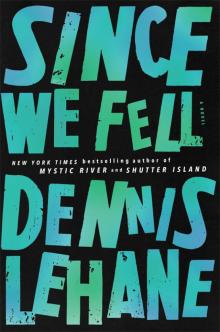 Since We Fell
Since We Fell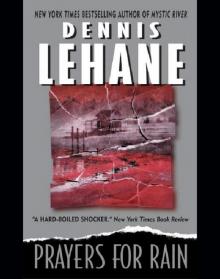 Prayers for Rain
Prayers for Rain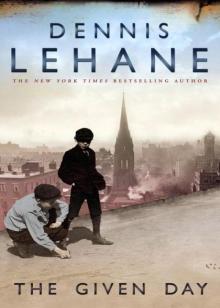 The Given Day
The Given Day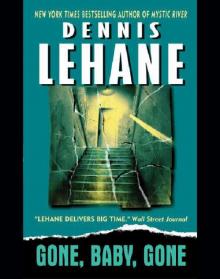 Gone, Baby, Gone
Gone, Baby, Gone Mystic River
Mystic River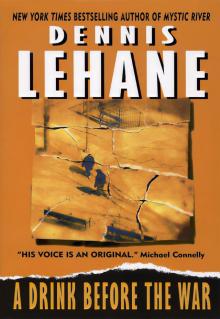 A Drink Before the War
A Drink Before the War Shutter Island
Shutter Island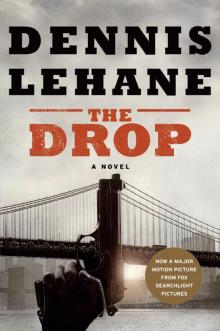 The Drop
The Drop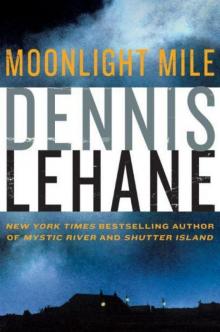 Moonlight Mile
Moonlight Mile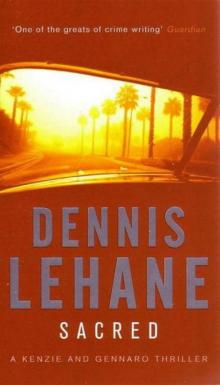 Sacred
Sacred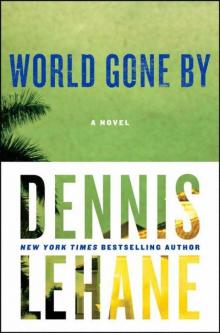 World Gone By
World Gone By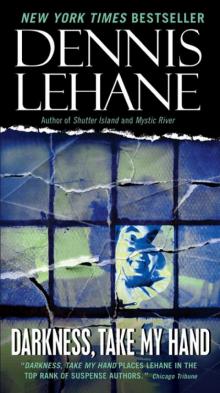 Darkness, Take My Hand
Darkness, Take My Hand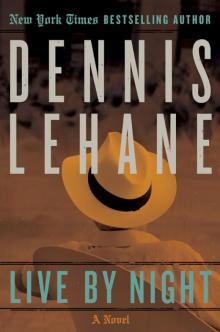 Live by Night
Live by Night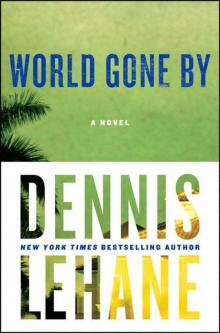 World Gone By: A Novel
World Gone By: A Novel Coronado
Coronado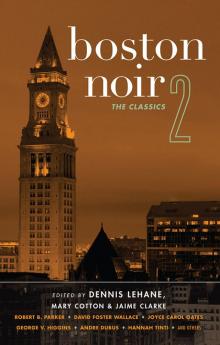 Boston Noir 2
Boston Noir 2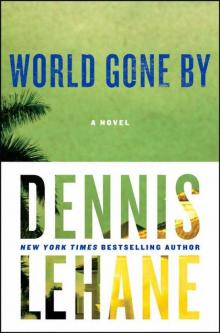 World Gone By: A Novel (Joe Coughlin Series)
World Gone By: A Novel (Joe Coughlin Series)